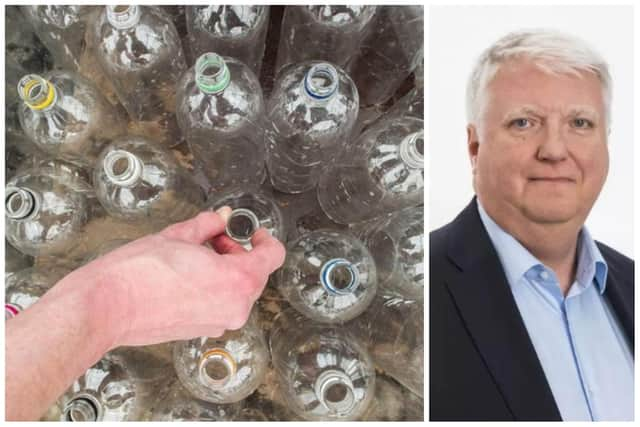Deposit return scheme Scotland: MSPs condemn ‘monstrous’ payments to DRS executives at Circularity Scotland
Lorna Slater repeatedly declined to disclose to Holyrood when she became aware of the payments to Circularity Scotland’s board members, a stance described as an “insult” to the Parliament. It comes after Scotland on Sunday revealed the £300,000 salary of chief executive David Harris, as well as the near £370,000 in annual fees that are being paid to six other members of Circularity Scotland’s board. The sums have sparked widespread anger across producers, many of whom have expressed concern the crisis-hit scheme will threaten their financial sustainability.
Confidential correspondence sent by Craig Anderson, the chair of Circularity Scotland’s board, shows that in addition to Mr Harris’s salary, Mr Anderson, a former managing partner of KPMG in Scotland, is being paid £100,000 per annum. John Dunsmore, a senior independent director is receiving £57,000. with Pamela Scott, chair of the firm’s remuneration committee, being paid £55,000. Two other board members – Jane Scott and Arnu Misra – are each receiving £50,000 a year.
Advertisement
Hide AdAdvertisement
Hide AdAsked by Scottish Labour’s Colin Smyth whether the Government regarded it as appropriate for Mr Harris to receive such a salary, Ms Slater said Circularity Scotland was a not-for-profit firm “delivered and funded by industry”, and stressed it was “separate” from Government, which had no role over its recruitment or remuneration.
Mr Smyth questioned Ms Slater if she was aware of the likely wage structure when she approved Circularity Scotland as the DRS administrator and, if not, when she became aware of the plans to pay such “excessive” salaries, adding: “It seems this monopoly as a licence from the minister to print money not for the benefit of producers, but for the benefit of their own bosses.”
Ms Slater did not answer the question directly, insisting it would be inappropriate for ministers to “interfere” in the affairs of a private company. But Mr Smyth hit back: “The minister needs to learn to answer the question that she’s asked … given the importance of ensuring value for money for small producers, who are deeply worried about the cost of this scheme, surely the minister should have asked for this information before she made that decision?”
He went on: “Given that she now knows what those excessive, eye-watering salaries are, how does she expect small producers to sign up for a scheme when they are being so clearly ripped off, and part of their fees are being used for the excessive salaries of bosses who are using Scotland as a stepping stone for their wider aim of running deposit return schemes right across the UK?”
Ms Slater said any other organisation could have applied to fulfil the role of the DRS administrator, provided they met the requirements set out in the scheme’s regulations. “The regulations were passed by this Parliament, and Circularity Scotland was an applicant who met those regulations,” she responded.


Fergus Ewing, the veteran SNP MSP and former business minister, criticised Ms Slater for her failure to answer “straightforward questions”, and described Circularity Scotland as “a creature entirely out of control”. He told MSPs: “It’s deciding its own policies, it’s deciding its own salaries, and it will decimate small businesses throughout Scotland, whether they be shops, pubs, clubs, brewers, distillers, or recycling companies.”
Mr Ewing asked Ms Slater: “Have you not, on behalf of the Scottish Government, in creating Circularity Scotland, created a monster, a modern day, 21st-century Frankenstein, entirely out of control?”
She replied: “Circularity Scotland has been created by industry to support Scottish businesses to comply with the regulations passed by this parliament. The approach of an industry-led, industry paid for scheme was supported by the Scottish Labour and the Scottish Conservatives, and is the same as schemes around the world. We are not reinventing the wheel here.”
Advertisement
Hide AdAdvertisement
Hide AdBut Scottish Conservative Stephen Kerr MSP said: “The minister cannot be serious. It’s an insult to this Parliament that she comes here, is asked questions, and reads a scripted answer whether it’s relevant to the question that’s been asked or not.
“Is she seriously saying that this not-for-profit [firm] that she has facilitated the creation of can do what it likes? The people of Scotland will have formed their own view on these monstrous salary numbers, and they’ll also be forming a view of the incompetence of this minister, who is patently not fit for purpose.”
Meanwhile, a cross-party group of MSPs has joined the trade body for Scotland’s SME resource and waste management operators in condemning Circularity Scotland’s decision to appoint Biffa as the scheme’s official logistics service provider. The firm will be responsible for collecting containers and managing bulking and counting centres where the materials will be processed for recycling.
Resource Management Association Scotland (RMAS) has accused Circularity Scotland and Biffa of failing to meet a pledge to explore opportunities to utilise the sector’s existing infrastructure, collection services and networks to operate the DRS. It said the decision to appoint a single, centralised contractor will “decimate” smaller waste operators leading to lost revenues, job cuts and a reduction in customer choice for waste collection services, especially in remote, rural and island communities.
RMAS has been backed by Mr Ewing, his fellow SNP MSP, Christine Grahame; Scottish Labour’s Claire Baker, the Scottish Liberal Democrat’s Liam McArthur; and Maurice Golden from the Scottish Conservatives. All have called for a rethink on the single contract approach, and stressed the need to adopt an evidence-based approach to the launch of the scheme.
Comments
Want to join the conversation? Please or to comment on this article.